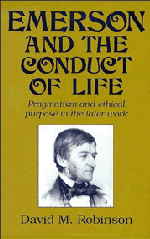Crossref Citations
This Book has been
cited by the following publications. This list is generated based on data provided by Crossref.
Wilson, Eric
1999.
Emerson's Sublime Science.
p.
1.
Dryden, Windy
and
Still, Arthur
1999.
When did a psychologist last discuss ‘chagrin’? American psychology’s continuing moral project.
History of the Human Sciences,
Vol. 12,
Issue. 4,
p.
93.
Schöpp, Joseph C.
Reinhart, Werner
Tonn, Horst
Mayer, Kurt A.
Müller, Wolfgang G.
Opfermann, Susanne
Porsche, Michael
Hollweg, Brenda
Pianos, Tamara
Reichardt, Ulfried
Nünning, Ansgar
Ensslen, Klaus
Nestvold, Ruth
Berkemeier, Christian
Binder, Wolfgang
Zapf, Harald
Halfmann, Ulrich
Herget, Winfried
Hurm, Gerd
Moss, Maria
Person, Jutta
Zimmermann, Jutta
Bach, Gerhard
von Finck, Diana
Claviez, Thomas
Kalb, Kristina
Heide, Markus
Leypoldt, Günter
Scheiding, Oliver
Hebel, Udo
Klepper, Martin
Grandel, Hartmut
Mayer, Sylvia
Leitner-Rudolph, Miryam
Koenen, Anne
Kelleter, Frank
Requardt, Nadine
Hölbling, Walter
Fischer, Katrin
Schäfer-Wünsche, Elisabeth
Keitel, Evelyne
Fluck, Winfried
Breinig, Helmbrecht
Werner, Florian
Salheiser, Britta
Grewe-Volpp, Christa
Brenner, Wolfgang
Reinicke, Gesine
Bischoff, Volker
Ernst, Jutta
Georgi-Findlay, Brigitte
Wegener, Cornelia
Sielke, Sabine
Müller, Kurt
Schmidt, Klaus H.
Lührmann, Silke
Schulz, Dieter
Lutz, Hartmut
Smolinski, Reiner
Roth, Yvonne
Ickstadt, Heinz
Lemke, Sieglinde
Sichert, Margit
Mitchell, Tanja
Hinz, Kristina
Engler, Bernd
Taumann, Beatrix
Steinert, Ilka
Schwank, Klaus
Groß, Konrad
Colavincenzo, Marc
Braun, Hartmut
Scholz, Anne-Marie
Paul, Heike
Guillemin, Georg
Gersdorf, Cathrin
Freese, Peter
Zacharasiewicz, Waldemar
Fleischmann, Brigitte
Ghosh-Schellhorn, Martina
Hüppe, Barbara
Hof, Renate
Kanzler, Katja
Pehnt, Annette
Tranker, Brigitte
Heuser, Sabine
Wieselhuber, Franz
Lönnecke, Annette
Draxlbauer, Michael
Surkamp, Carola
and
Thurner, Bettina
2000.
Metzler Lexikon Amerikanischer Autoren.
p.
1.
Kurtz, Jeffrey B.
2001.
“Condemning Webster: Judgment and audience in Emerson's ‘fugitive slave law’ “.
Quarterly Journal of Speech,
Vol. 87,
Issue. 3,
p.
278.
Friedl, Herwig
2002.
Schriftgedächtnis — Schriftkulturen.
p.
459.
RICHARDSON, TODD H.
2006.
Emerson Iconography and the Free Religious Index
.
Resources for American Literary Study,
Vol. 31,
Issue. 1,
p.
11.
RICHARDSON, TODD H.
2006.
Emerson Iconography and the Free Religious Index
.
Resources for American Literary Study,
Vol. 31,
Issue. 1,
p.
11.
BRAY, JESSIE
2007.
“Not a pure idealist”: Ralph Waldo Emerson, Edward Waldo Emerson, and the Civil War.
Resources for American Literary Study,
Vol. 32,
Issue. 1,
p.
85.
LEKAN, TODD
2007.
Appreciating the Impersonal in Emerson (That's What Friends Are For).
The Journal of Speculative Philosophy,
Vol. 21,
Issue. 2,
p.
91.
LEKAN, TODD
2007.
Appreciating the Impersonal in Emerson (That's What Friends Are For).
The Journal of Speculative Philosophy,
Vol. 21,
Issue. 2,
p.
91.
BRAY, JESSIE
2007.
“Not a pure idealist”: Ralph Waldo Emerson, Edward Waldo Emerson, and the Civil War.
Resources for American Literary Study,
Vol. 32,
Issue. 1,
p.
85.
GRIFFIN, MARTIN
2008.
EMERSON'S CROSSING:ENGLISH TRAITSAND THE POLITICS OF “POLITICS”.
Modern Intellectual History,
Vol. 5,
Issue. 2,
p.
251.
Urbas, Joseph
2010.
Cavell’s “Moral Perfectionism” or Emerson’s “Moral Sentiment”?.
European Journal of Pragmatism and American Philosophy,
Vol. II,
Issue. 2,
McKanan, Daniel
2013.
“Unitarianism, Universalism, and Unitarian Universalism”.
Religion Compass,
Vol. 7,
Issue. 1,
p.
15.
CRANE, GREGG
2013.
INTUITION: THE “UNSEEN THREAD” CONNECTING EMERSON AND JAMES.
Modern Intellectual History,
Vol. 10,
Issue. 1,
p.
57.
Risinger, Jacob
2014.
Transatlantic Fate: Emerson, Cavell, and Beautiful Necessity.
European Romantic Review,
Vol. 25,
Issue. 3,
p.
357.
2014.
Politics and Skepticism in Antebellum American Literature.
p.
186.
Kubicka, Joanna
2016.
Na przełomie. Pozytywiści warszawscy i pomoc własna.
Nørager, Troels
2016.
»What is Human?«.
p.
235.
Plotica, Luke Philip
2018.
Nineteenth-Century Individualism and the Market Economy.
p.
71.



